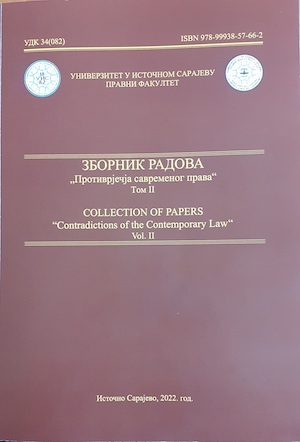Савремени приступ писмености и неписмености као класичним криминолошким темам
Contemporary Approach to Literacy and Illiteracy as Classic Criminology Topics
Author(s): Marina M. Simović, Miomira P. Kostić
Subject(s): Law, Constitution, Jurisprudence, Criminal Law, Criminology
Published by: Правни факултет Универзитета у Источном Сарајеву
Keywords: Literacy; Illiteracy; Culture; Deliquency; UNESCO; Gender sensitive language; Gender equality;
Summary/Abstract: There is no consensus in the criminology literature on how education can influence the expression of delinquent activities (pessimistic and optimistic currents of opinion), although statistics show that delinquents include a large number of those with low education and a lower level of culture. The authors first pointed out the explanation of the concept of literacy/illiteracy. Literacy is the ability to use available systems of symbols, which are the basis of learning and teaching, for the purpose of understanding and composing, or for the purpose of compiling communicative meaning and knowledge. Literacy is a boarder concept than the printed word, which is read or written. It is shaped by context, participants and applied technologies. Today's context encompasses the development of technology, along with visual. audio, gestural, spatial, or multimedia discourse. Some scholars claim that, from historical point of view, there has always been some crisis moment in literacy. Taking into account the tradition, criticism and approach to literacy, UNESCO documents identify four areas of understanding literacy: literacy as an independent set of skills,; literacy as something that is applied; practiced and is an established condition; literacy as learning process; literacy as text; word content. By pointing out the statistical prevalence of illiteracy among the population in Serbia and criminological observation of the relationship between illiteracy and delinquency, the authors also refer to the provisions of the Law on Gender Equity, adopted ion 20 May 2021 in Serbia, which raised a number of questions in domestic public regarding the application of this law, especially the part related to the use of gender sensitive language. The subtlety of conflicting argument that are for and against certain legal solutions related to the use of gender-sensitive language indicates the strength of scientific and professional wealth of linguistic knowledge that, in accordance with our own preferences, we may or may not accept. But, for this very reason, the authors encouraged by the diversity of the power of argumentation, return to criminological beginnings of one of the most important requirements for human survival - literacy.
Book: Зборник радова "Противрјечја савременог права" Том II
- Page Range: 438-451
- Page Count: 14
- Publication Year: 2022
- Language: Serbian
- Content File-PDF

